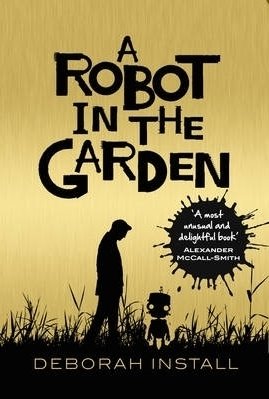Search

ZOOLA Animals
Education
App
"It’s the app that National Geographic should have designed for kids.” ▶...

My PlayHome
Entertainment and Education
App
▶ Featured in THE NEW YORK TIMES: Apps to Keep Children Happy ▶ TOP 10 BEST KIDS APPS OF THE...

PlayKids - Cartoons for kids
Education and Entertainment
App
PlayKids is the #1 children’s app in more than 25 countries. Kid Safe Toddler App. Kids and...
Hazel (1853 KP) rated A Robot in the Garden in Books
May 25, 2017
So Sweet
This ebook was provided by the publisher via NetGalley in exchange for an honest review
What would you do if you found a robot in your garden? That is exactly what, as the title suggests, 34-year-old Ben has to answer on making this discovery early one September morning. Set in the near future where many people have androids in their houses to do the chores they do not wish to do, finding a robot is not a completely unsettling event. What is unusual, however, is that this particular robot is the opposite of the modern, shiny models: he appears to be a mishmash of Japanese fine art and something you would find on a scrap heap.
As Ben discovers, the robot, named Tang is broken and is in need of urgent care and repair. Ben becomes obsessed with trying to pry information out of the robot as to where he came from and to whom he belongs to. Bringing Tang into the house is the last straw for his wife, Amy, who after letting him know all his faults – unemployment, never achieved anything – walks out on him. Now alone, with no one else to worry about, Ben is determined to locate Tang’s creator and save the robot’s life.
What continues is a wild goose chase across America and over to Asia as the strange pairing – human and robot – follows hints and clues that could help them reach their destination. Along the way Ben gets to know Tang and learns to love him in the same way a father loves a child. No matter what mischief Tang gets himself into, Ben is always there to fix the situation. The only thing he cannot fix is Tang’s internal parts, and time is running out.
Initially the story was about a man who wanted to prove he could achieve something to show his sister and his, now, ex-wife that they were wrong about him. However later on in the novel Ben realizes he is changing for himself, not for anyone else, and the person – or robot – that has helped him to achieve this is Tang. On the other hand it is also a humorous tale that explores a character that is unable to connect to the world around him. Tang is like a human toddler who needs constant care and attention, and is fascinated by everything around him. With Ben’s love and attention he proves to the world that he is much more than a rusty metal box.
A Robot in the Garden is a gem of a novel that is guaranteed to make the reader laugh. It is also touching and emotionally engaging, with both heartwarming and heart wrenching moments. Deborah Install has created an accurate representation of a character that has no understanding of the happenings in the world around it, basing many hilarious instances on those of her young son.
Whilst reading this book I could not help but compare it to the film Short Circuit (1986) in which a robot is electrocuted and gains human intelligence. I kept picturing the storyline of A Robot in the Garden in my head and thinking up ways it could be portrayed on screen. Whether there are plans to make it into a film I have no idea, but I am sure it would make prize-winning picture.
Do not be put off by its science fiction classification; A Robot in the Garden is no War of the Worlds or Doctor Who type of story. Instead it is a brilliant piece if fiction suitable for all adults. Those with children will laugh at the similarities between Tang and their offspring, whereas those without will sympathise with Ben’s struggles to keep the robot under control. All in all a great novel.
What would you do if you found a robot in your garden? That is exactly what, as the title suggests, 34-year-old Ben has to answer on making this discovery early one September morning. Set in the near future where many people have androids in their houses to do the chores they do not wish to do, finding a robot is not a completely unsettling event. What is unusual, however, is that this particular robot is the opposite of the modern, shiny models: he appears to be a mishmash of Japanese fine art and something you would find on a scrap heap.
As Ben discovers, the robot, named Tang is broken and is in need of urgent care and repair. Ben becomes obsessed with trying to pry information out of the robot as to where he came from and to whom he belongs to. Bringing Tang into the house is the last straw for his wife, Amy, who after letting him know all his faults – unemployment, never achieved anything – walks out on him. Now alone, with no one else to worry about, Ben is determined to locate Tang’s creator and save the robot’s life.
What continues is a wild goose chase across America and over to Asia as the strange pairing – human and robot – follows hints and clues that could help them reach their destination. Along the way Ben gets to know Tang and learns to love him in the same way a father loves a child. No matter what mischief Tang gets himself into, Ben is always there to fix the situation. The only thing he cannot fix is Tang’s internal parts, and time is running out.
Initially the story was about a man who wanted to prove he could achieve something to show his sister and his, now, ex-wife that they were wrong about him. However later on in the novel Ben realizes he is changing for himself, not for anyone else, and the person – or robot – that has helped him to achieve this is Tang. On the other hand it is also a humorous tale that explores a character that is unable to connect to the world around him. Tang is like a human toddler who needs constant care and attention, and is fascinated by everything around him. With Ben’s love and attention he proves to the world that he is much more than a rusty metal box.
A Robot in the Garden is a gem of a novel that is guaranteed to make the reader laugh. It is also touching and emotionally engaging, with both heartwarming and heart wrenching moments. Deborah Install has created an accurate representation of a character that has no understanding of the happenings in the world around it, basing many hilarious instances on those of her young son.
Whilst reading this book I could not help but compare it to the film Short Circuit (1986) in which a robot is electrocuted and gains human intelligence. I kept picturing the storyline of A Robot in the Garden in my head and thinking up ways it could be portrayed on screen. Whether there are plans to make it into a film I have no idea, but I am sure it would make prize-winning picture.
Do not be put off by its science fiction classification; A Robot in the Garden is no War of the Worlds or Doctor Who type of story. Instead it is a brilliant piece if fiction suitable for all adults. Those with children will laugh at the similarities between Tang and their offspring, whereas those without will sympathise with Ben’s struggles to keep the robot under control. All in all a great novel.
Sassy Brit (97 KP) rated Love, Secrets and Absolution in Books
Jun 6, 2019
Contains spoilers, click to show
I’m reviewing Love, Secrets and Absolution, by K.L. Lovely. Here are my thoughts:
^^ Told from alternative viewpoints, Love, Secrets and Absolution is an emotional story revolving around the lives of a couple, Grace and Paul, who are trying to come to terms with the stresses and strains of bringing up an autistic child. But what makes this story different is how it’s set at a time which coincides with the Nottingham miners strikes of the 80s, where pit closures and pay restraints led to unofficial strikes, job losses and violence. Harsh times to say the least. This added a new dimension to the story, and of course, more pressure for Paul, and ultimately the whole family. They were terrible times in Britain, a lot of families suffered because of it.
^^ Right from the beginning we see young Alfie is different to other children. The author, K. L.oveley, helps show us this, by what I thought was a highly unusual technique- giving baby and toddler versions of Alfie his own voice.
^^ I must admit at first I was thinking, this doesn’t sound like a baby. After all, very young babies are not able to communicate in such a coherent manner. However, as I read further, I saw how Alfie’s voice as a child — seeing things differently from his POV — really helped to provide a deeper look into his inner thoughts and feelings. A fresh and unique approach, which revealed his own perspective of how he didn’t fit in with other kids, even if he was unable to understand the “why” himself. Very clever. It certainly made things clearer for me and highlighted aspects of autism I may have missed otherwise.
^^ Taking the time-period into consideration, I found the portrayal of the teachers and the way they behaved cruelly and professionally towards Alfie and Grace shocking, yet realistic. Back in those days many professionals were not trained to spot differences and learning difficulties in the way they are today. To outsiders who didn’t understand what Alfie was going though and thinking, he did just look like a trouble maker. Nowadays we know better and there is an ever-growing awareness and understanding of the many different spectrums of autism.
^^ Alfie’s father, Paul, may not have won the best dad of the year award, but I felt he was a realistic representation of a man living and working in a very masculine environment, where men were largely regarded as the breadwinners of the household and job scarcity was a huge issue. He didn’t know how to handle Alfie, and in a way you can’t blame him for that. Not everyone is capable of being a really good parent, especially when their own life has turned upside down in a blink of an eye.
^^ There’s also a really good story line around a girl called Magenta, which I felt helped strengthen both Alfie and Grace’s bond. A lovely touch. As was Grace’s newfound strength and courage, which really made this story become more than just gloom and doom. Her steadfast devotion to her son is both amazing and commendable, and I enjoyed seeing how she turned her life around.
Overall: This thought-provoking book is as much about relationships, as it is autism. We see the hopes and dreams of a young family shattered by a lack of communication, misunderstandings and even betrayal. Yet, despite all the struggles and heartache this family go through, we discover the true power of love; how it can heal, comfort and carry us forward through the toughest of times. A heart-warming, memorable and most satisfying read.
^^ Told from alternative viewpoints, Love, Secrets and Absolution is an emotional story revolving around the lives of a couple, Grace and Paul, who are trying to come to terms with the stresses and strains of bringing up an autistic child. But what makes this story different is how it’s set at a time which coincides with the Nottingham miners strikes of the 80s, where pit closures and pay restraints led to unofficial strikes, job losses and violence. Harsh times to say the least. This added a new dimension to the story, and of course, more pressure for Paul, and ultimately the whole family. They were terrible times in Britain, a lot of families suffered because of it.
^^ Right from the beginning we see young Alfie is different to other children. The author, K. L.oveley, helps show us this, by what I thought was a highly unusual technique- giving baby and toddler versions of Alfie his own voice.
^^ I must admit at first I was thinking, this doesn’t sound like a baby. After all, very young babies are not able to communicate in such a coherent manner. However, as I read further, I saw how Alfie’s voice as a child — seeing things differently from his POV — really helped to provide a deeper look into his inner thoughts and feelings. A fresh and unique approach, which revealed his own perspective of how he didn’t fit in with other kids, even if he was unable to understand the “why” himself. Very clever. It certainly made things clearer for me and highlighted aspects of autism I may have missed otherwise.
^^ Taking the time-period into consideration, I found the portrayal of the teachers and the way they behaved cruelly and professionally towards Alfie and Grace shocking, yet realistic. Back in those days many professionals were not trained to spot differences and learning difficulties in the way they are today. To outsiders who didn’t understand what Alfie was going though and thinking, he did just look like a trouble maker. Nowadays we know better and there is an ever-growing awareness and understanding of the many different spectrums of autism.
^^ Alfie’s father, Paul, may not have won the best dad of the year award, but I felt he was a realistic representation of a man living and working in a very masculine environment, where men were largely regarded as the breadwinners of the household and job scarcity was a huge issue. He didn’t know how to handle Alfie, and in a way you can’t blame him for that. Not everyone is capable of being a really good parent, especially when their own life has turned upside down in a blink of an eye.
^^ There’s also a really good story line around a girl called Magenta, which I felt helped strengthen both Alfie and Grace’s bond. A lovely touch. As was Grace’s newfound strength and courage, which really made this story become more than just gloom and doom. Her steadfast devotion to her son is both amazing and commendable, and I enjoyed seeing how she turned her life around.
Overall: This thought-provoking book is as much about relationships, as it is autism. We see the hopes and dreams of a young family shattered by a lack of communication, misunderstandings and even betrayal. Yet, despite all the struggles and heartache this family go through, we discover the true power of love; how it can heal, comfort and carry us forward through the toughest of times. A heart-warming, memorable and most satisfying read.
Purple Phoenix Games (2266 KP) rated Happy Salmon in Tabletop Games
Jun 12, 2019
Brain burners. We have all played them. They typically aren’t my cup of tea because usually when I get to play games it is later in the evening. By that time I have had a full day’s work, taken care of a toddler (or more depending on when you read this), and thus my brainpower tank is already close to empty. Throw a game or two on top and I’m all mushy upstairs. ENTER: HAPPY SALMON.
Disclaimer (if needed): We are only reviewing the green version of this game. We know you can buy the blue version and add the cards for more players, but we haven’t done that yet. So we are just sticking with green for now. -T
In the activity Happy Salmon (let’s be honest, this isn’t necessarily a “game” so much as an “activity”) each player has a color-coded personal deck of cards that must be shuffled and held face-down. The players then stand in a circle. Setup is complete. The object of the game is to be the first player to deplete your deck of cards. You do so by turning over the top card of your deck and hopefully matching its face with another player who has turned over their copy of that card. Sounds easy right?
The “activity” portion and/or meat of this game happens when you find your match – you must both DO the action listed on your card. It could be as easy as high-fiving each other. Or pounding knuckles. Or simply switching places in the circle (see photo below). But then you have the ol’ Happy Salmon card which requires each player to do this absurd salmon handshake action that could be entertainment enough for the group if you have players with less-than-stellar bodily coordination.
So this doesn’t really sound all that appealing, I know. And I also wouldn’t have given it another thought, except I heard the guys from Dukes of Dice podcast raving about how rejuvenated they felt after having played this in the middle of an intense game sesh. I trust the opinions of Sean and Alex, and the price was right for me, so I picked it up. Boy am I glad I did! Now, this isn’t a game that I will bring out to every game session, nor with every play group, but I WILL pull this out if anyone is getting a little sleepy, or if we just want to shake out our bodies and our brains to hit up another long game.
The components are easy to discuss. It’s a fish made out of mousepad material that zips open and holds all the cards. The fish is great, but I really don’t care for “boxes” that aren’t… well, boxes. It’s great quality though. The cards, on the other hand, are really flimsy and make your hand sweaty. I don’t think I will sleeve these cards ever, as a replacement set is VERY affordable, and I do not really have any other suggestions to alleviate this “problem,” but the cards are just okay-quality. I suppose you are just flipping them over and then chucking them on the floor anyway, but for an extra $5 on the price of the game I would have preferred more rugged cards.
What this game lacks in hardcore thinkyness, prestige, and strategy, it makes up for in fun, hilarious moments, and plays that become raucously entertaining bits of your life you may never forget. It will never be on my Top 10 list, but it’s currently on my Top 100 and I will never get rid of my copy. For those reasons Purple Phoenix Games gives Happy Salmon a very appreciative 12 / 18 (Laura claims to have never played it).
https://purplephoenixgames.wordpress.com/2019/03/08/happy-salmon-review/
Disclaimer (if needed): We are only reviewing the green version of this game. We know you can buy the blue version and add the cards for more players, but we haven’t done that yet. So we are just sticking with green for now. -T
In the activity Happy Salmon (let’s be honest, this isn’t necessarily a “game” so much as an “activity”) each player has a color-coded personal deck of cards that must be shuffled and held face-down. The players then stand in a circle. Setup is complete. The object of the game is to be the first player to deplete your deck of cards. You do so by turning over the top card of your deck and hopefully matching its face with another player who has turned over their copy of that card. Sounds easy right?
The “activity” portion and/or meat of this game happens when you find your match – you must both DO the action listed on your card. It could be as easy as high-fiving each other. Or pounding knuckles. Or simply switching places in the circle (see photo below). But then you have the ol’ Happy Salmon card which requires each player to do this absurd salmon handshake action that could be entertainment enough for the group if you have players with less-than-stellar bodily coordination.
So this doesn’t really sound all that appealing, I know. And I also wouldn’t have given it another thought, except I heard the guys from Dukes of Dice podcast raving about how rejuvenated they felt after having played this in the middle of an intense game sesh. I trust the opinions of Sean and Alex, and the price was right for me, so I picked it up. Boy am I glad I did! Now, this isn’t a game that I will bring out to every game session, nor with every play group, but I WILL pull this out if anyone is getting a little sleepy, or if we just want to shake out our bodies and our brains to hit up another long game.
The components are easy to discuss. It’s a fish made out of mousepad material that zips open and holds all the cards. The fish is great, but I really don’t care for “boxes” that aren’t… well, boxes. It’s great quality though. The cards, on the other hand, are really flimsy and make your hand sweaty. I don’t think I will sleeve these cards ever, as a replacement set is VERY affordable, and I do not really have any other suggestions to alleviate this “problem,” but the cards are just okay-quality. I suppose you are just flipping them over and then chucking them on the floor anyway, but for an extra $5 on the price of the game I would have preferred more rugged cards.
What this game lacks in hardcore thinkyness, prestige, and strategy, it makes up for in fun, hilarious moments, and plays that become raucously entertaining bits of your life you may never forget. It will never be on my Top 10 list, but it’s currently on my Top 100 and I will never get rid of my copy. For those reasons Purple Phoenix Games gives Happy Salmon a very appreciative 12 / 18 (Laura claims to have never played it).
https://purplephoenixgames.wordpress.com/2019/03/08/happy-salmon-review/
Hazel (1853 KP) rated A Robot in the Garden in Books
Dec 14, 2018
<i>This ebook was provided by the publisher via NetGalley in exchange for an honest review </i>
What would you do if you found a robot in your garden? That is exactly what, as the title suggests, 34-year-old Ben has to answer on making this discovery early one September morning. Set in the near future where many people have androids in their houses to do the chores they do not wish to do, finding a robot is not a completely unsettling event. What is unusual, however, is that this particular robot is the opposite of the modern, shiny models: he appears to be a mishmash of Japanese fine art and something you would find on a scrap heap.
As Ben discovers, the robot, named Tang is broken and is in need of urgent care and repair. Ben becomes obsessed with trying to pry information out of the robot as to where he came from and to whom he belongs to. Bringing Tang into the house is the last straw for his wife, Amy, who after letting him know all his faults – unemployment, never achieved anything – walks out on him. Now alone, with no one else to worry about, Ben is determined to locate Tang’s creator and save the robot’s life.
What continues is a wild goose chase across America and over to Asia as the strange pairing – human and robot – follows hints and clues that could help them reach their destination. Along the way Ben gets to know Tang and learns to love him in the same way a father loves a child. No matter what mischief Tang gets himself into, Ben is always there to fix the situation. The only thing he cannot fix is Tang’s internal parts, and time is running out.
Initially the story was about a man who wanted to prove he could achieve something to show his sister and his, now, ex-wife that they were wrong about him. However later on in the novel Ben realizes he is changing for himself, not for anyone else, and the person – or robot – that has helped him to achieve this is Tang. On the other hand it is also a humorous tale that explores a character that is unable to connect to the world around him. Tang is like a human toddler who needs constant care and attention, and is fascinated by everything around him. With Ben’s love and attention he proves to the world that he is much more than a rusty metal box.
<i>A Robot in the Garden</i> is a gem of a novel that is guaranteed to make the reader laugh. It is also touching and emotionally engaging, with both heartwarming and heart wrenching moments. Deborah Install has created an accurate representation of a character that has no understanding of the happenings in the world around it, basing many hilarious instances on those of her young son.
Whilst reading this book I could not help but compare it to the film <i>Short Circuit</i> (1986) in which a robot is electrocuted and gains human intelligence. I kept picturing the storyline of <i>A Robot in the Garden</i> in my head and thinking up ways it could be portrayed on screen. Whether there are plans to make it into a film I have no idea, but I am sure it would make prize-winning picture.
Do not be put off by its science fiction classification; <i>A Robot in the Garden</i> is no <i>War of the Worlds</i> or <i>Doctor Who</i> type of story. Instead it is a brilliant piece if fiction suitable for all adults. Those with children will laugh at the similarities between Tang and their offspring, whereas those without will sympathise with Ben’s struggles to keep the robot under control. All in all a great novel.
What would you do if you found a robot in your garden? That is exactly what, as the title suggests, 34-year-old Ben has to answer on making this discovery early one September morning. Set in the near future where many people have androids in their houses to do the chores they do not wish to do, finding a robot is not a completely unsettling event. What is unusual, however, is that this particular robot is the opposite of the modern, shiny models: he appears to be a mishmash of Japanese fine art and something you would find on a scrap heap.
As Ben discovers, the robot, named Tang is broken and is in need of urgent care and repair. Ben becomes obsessed with trying to pry information out of the robot as to where he came from and to whom he belongs to. Bringing Tang into the house is the last straw for his wife, Amy, who after letting him know all his faults – unemployment, never achieved anything – walks out on him. Now alone, with no one else to worry about, Ben is determined to locate Tang’s creator and save the robot’s life.
What continues is a wild goose chase across America and over to Asia as the strange pairing – human and robot – follows hints and clues that could help them reach their destination. Along the way Ben gets to know Tang and learns to love him in the same way a father loves a child. No matter what mischief Tang gets himself into, Ben is always there to fix the situation. The only thing he cannot fix is Tang’s internal parts, and time is running out.
Initially the story was about a man who wanted to prove he could achieve something to show his sister and his, now, ex-wife that they were wrong about him. However later on in the novel Ben realizes he is changing for himself, not for anyone else, and the person – or robot – that has helped him to achieve this is Tang. On the other hand it is also a humorous tale that explores a character that is unable to connect to the world around him. Tang is like a human toddler who needs constant care and attention, and is fascinated by everything around him. With Ben’s love and attention he proves to the world that he is much more than a rusty metal box.
<i>A Robot in the Garden</i> is a gem of a novel that is guaranteed to make the reader laugh. It is also touching and emotionally engaging, with both heartwarming and heart wrenching moments. Deborah Install has created an accurate representation of a character that has no understanding of the happenings in the world around it, basing many hilarious instances on those of her young son.
Whilst reading this book I could not help but compare it to the film <i>Short Circuit</i> (1986) in which a robot is electrocuted and gains human intelligence. I kept picturing the storyline of <i>A Robot in the Garden</i> in my head and thinking up ways it could be portrayed on screen. Whether there are plans to make it into a film I have no idea, but I am sure it would make prize-winning picture.
Do not be put off by its science fiction classification; <i>A Robot in the Garden</i> is no <i>War of the Worlds</i> or <i>Doctor Who</i> type of story. Instead it is a brilliant piece if fiction suitable for all adults. Those with children will laugh at the similarities between Tang and their offspring, whereas those without will sympathise with Ben’s struggles to keep the robot under control. All in all a great novel.
Gareth von Kallenbach (980 KP) rated Slender: The Arrival in Video Games
Jul 4, 2019
An Awful Experience All Around
A brief history for those who are not aware (courtesy of Wikipedia):
“The Slender Man (also known as Slenderman) is a fictional supernatural character that originated as a creepypasta internet meme… Stories of Slender Man commonly feature him stalking, abducting or traumatizing people, particularly children. The Slender Man is no confined to a single narrative, but appears in many works of fiction, typically composed online.”
Slender: The Arrival (which we’ll just refer to as The Arrival moving forward) is the official video game adaptation of Slender Man. Blue Isle studios developed the game to bring us improved visuals, great replay value, and a brand new storyline. These should combine into survival horror at its best. But sadly, it does not. The Arrival encourages exploration and the philosophy of scaring the living daylights out of you. It just doesn’t. Now, truth be told this genre is not typically my bread and butter, but I came into this game with hopeful expectations, but soon found myself wanting more than the game could offer.
First, you are thrown into the game without any instruction or opening. Just head down the road, though. It seems easy enough. I did appreciate the way they worked credits into this opening sequence though, as you are shown the developers and the team that worked on the game. Once you get through this, you come upon a house where you will explore the rooms to find notes scattered throughout the house giving you more information on your back story. Sparing spoilers, essentially the story revolves around a shared trauma from your youth. Once you leave the house, you press on, turning on some generators along your path.
You’ll come across the second house after crossing a river, where I encountered some of the strangeness I assume is part of the experience. Glitching visuals, weird creatures that seemed to disappear when you shine your flashlight upon them, that sort of thing. It could have been a bug, or bugs, but doing a little digging online it seems I was not the only one to experience the same. There wasn’t really any action to be had. A little disheartening.
There’s not much challenge with The Arrival. You will, at some point, encounter the Slender Man in the game. I went straight toward him, and nothing really happened. Unfortunately, it’s a bad byproduct of these games. If it doesn’t scare you, even in the slightest, you’re just left with a stagnant experience while you are running from point to point to read lore.
It took me nearly 2 hours to finish the game, though I suspect those without toddler twins may get through it a bit faster. Suffice it to say, I wish I had those 2 hours back. I never really felt the tension that would cause fear or even nervousness. The shaky cam visual of the game certainly didn’t help. Essentially, you are playing through the eyes of the camera you are holding, complete with “recording” indicator and battery level (you can turn this off). As you walk the camera bobs back and forth a little bit, and as you run it does so a little faster. I understand what they were trying to accomplish here, but it was executed so poorly. I found myself constantly trying to correct this with the joycon thinking it was simply drift. It was super distracting.
Slender: The Arrival failed to give a complete game worthy of the price tag, even at its current price tag of $9.99 on the eShop. That’s not to say you won’t enjoy it, especially if you scare VERY easily or are just a fan of the Slender Man himself. It’s just that combine a wonky control system, very little instruction, and no real tension building moments, and you have a dud of game in my book.
1 out of 5
http://sknr.net/2019/06/28/slender-the-arrival-for-nintendo-switch/
“The Slender Man (also known as Slenderman) is a fictional supernatural character that originated as a creepypasta internet meme… Stories of Slender Man commonly feature him stalking, abducting or traumatizing people, particularly children. The Slender Man is no confined to a single narrative, but appears in many works of fiction, typically composed online.”
Slender: The Arrival (which we’ll just refer to as The Arrival moving forward) is the official video game adaptation of Slender Man. Blue Isle studios developed the game to bring us improved visuals, great replay value, and a brand new storyline. These should combine into survival horror at its best. But sadly, it does not. The Arrival encourages exploration and the philosophy of scaring the living daylights out of you. It just doesn’t. Now, truth be told this genre is not typically my bread and butter, but I came into this game with hopeful expectations, but soon found myself wanting more than the game could offer.
First, you are thrown into the game without any instruction or opening. Just head down the road, though. It seems easy enough. I did appreciate the way they worked credits into this opening sequence though, as you are shown the developers and the team that worked on the game. Once you get through this, you come upon a house where you will explore the rooms to find notes scattered throughout the house giving you more information on your back story. Sparing spoilers, essentially the story revolves around a shared trauma from your youth. Once you leave the house, you press on, turning on some generators along your path.
You’ll come across the second house after crossing a river, where I encountered some of the strangeness I assume is part of the experience. Glitching visuals, weird creatures that seemed to disappear when you shine your flashlight upon them, that sort of thing. It could have been a bug, or bugs, but doing a little digging online it seems I was not the only one to experience the same. There wasn’t really any action to be had. A little disheartening.
There’s not much challenge with The Arrival. You will, at some point, encounter the Slender Man in the game. I went straight toward him, and nothing really happened. Unfortunately, it’s a bad byproduct of these games. If it doesn’t scare you, even in the slightest, you’re just left with a stagnant experience while you are running from point to point to read lore.
It took me nearly 2 hours to finish the game, though I suspect those without toddler twins may get through it a bit faster. Suffice it to say, I wish I had those 2 hours back. I never really felt the tension that would cause fear or even nervousness. The shaky cam visual of the game certainly didn’t help. Essentially, you are playing through the eyes of the camera you are holding, complete with “recording” indicator and battery level (you can turn this off). As you walk the camera bobs back and forth a little bit, and as you run it does so a little faster. I understand what they were trying to accomplish here, but it was executed so poorly. I found myself constantly trying to correct this with the joycon thinking it was simply drift. It was super distracting.
Slender: The Arrival failed to give a complete game worthy of the price tag, even at its current price tag of $9.99 on the eShop. That’s not to say you won’t enjoy it, especially if you scare VERY easily or are just a fan of the Slender Man himself. It’s just that combine a wonky control system, very little instruction, and no real tension building moments, and you have a dud of game in my book.
1 out of 5
http://sknr.net/2019/06/28/slender-the-arrival-for-nintendo-switch/
Gareth von Kallenbach (980 KP) rated Parental Guidance (2012) in Movies
Aug 7, 2019
I don’t really know where to start with this review. I guess I’ll start with what I’m expecting to see when I see a preview. I’m really bad at assuming I know what’s going to happen. Sometimes I’m right, happily sometimes I’m wrong, and then there are times, like with this movie, where it’s half and half.
The movie starts out with Artie Decker (Billy Crystal) as ‘de voice’ of his local Grizzlies’ baseball team. He’s really good at commentating and he loves doing it but after the last game of the season he gets fired. It’s predictable why he’s fired, basically he doesn’t poke or tweet, and I think they thought they hit gold with that moment of comedy but for me, eh. When he gets home his wife Diane (Bette Midler) comforts him. He’s lost for a moment since he wasn’t ready to stop but then decides he should chase his dream to commentate for the Giants though he doesn’t know where to start.
We shoot over to Alice Simmons (Marisa Tomei) Artie and Diane’s daughter, and her husband Phil, (Tom Everett Scott) who live in such a modern electronic home that it’s actually all controlled by a beta system called Rlife. Rlife can be programmed for alarm times, music, food, pretty much everything for each family member. This Rlife is Phil’s dream he gets invited to a conference to get his Rlife hopefully in production. Alice is going to with him, kind of a semi work vacation and they need Artie and Diane to watch the kids for a week.
What makes the divide even greater between Alice and her kids from Artie is that Alice and Phil are raising their kids in a new school that is different from Artie’s old school, tough love and strict rules. They use phrases like ‘use your words’ or if you give a ‘put down’ you have to give ‘three ups’ and you can’t use the word ‘no’ you have to say ‘think about the consequences’.
Their oldest, a young teen, is their only daughter Harper, Bailee Madison, who is extremely uptight and carrying the weight of the world on her shoulders. Next we have the two boys, Turner, Joshua Rush, middle schooler, who stutters and is shy because of it, and the youngest Barker, Kyle Harrison Breitkopf, who is basically toddler with lots of energy, but seems to get away with a lot of bad behavior.
Diane realizes that they are the other grand parents, the ones that their grand kids don’t really like. Long story short, it’s supposed to be about being open to new ideas but it just feels like old school versus new school. Billy’s Crystal’s comedy and Bette Middler’s and Marisa Tomei’s acting can pull it out of the boredom for some laughs and good moments and there are a few situational laughs with the children as well, but that’s about it.
The truly redeeming quality to this movie, besides the three main actors is the ending, the last ten minutes. It’s a surprising heartwarming ending, and only slightly predictable. It sounds crazy but it actually brings the whole movie up from a two star to a three star for me. One last thing is that the guest I went with has two children of her own and tried to get me to change my rating from three to four. I really can’t do that but I think that means that if you have children of your own you might enjoy this a little bit more than I did.
Bottom line, renter, unless you love Bily Crystal.
The movie starts out with Artie Decker (Billy Crystal) as ‘de voice’ of his local Grizzlies’ baseball team. He’s really good at commentating and he loves doing it but after the last game of the season he gets fired. It’s predictable why he’s fired, basically he doesn’t poke or tweet, and I think they thought they hit gold with that moment of comedy but for me, eh. When he gets home his wife Diane (Bette Midler) comforts him. He’s lost for a moment since he wasn’t ready to stop but then decides he should chase his dream to commentate for the Giants though he doesn’t know where to start.
We shoot over to Alice Simmons (Marisa Tomei) Artie and Diane’s daughter, and her husband Phil, (Tom Everett Scott) who live in such a modern electronic home that it’s actually all controlled by a beta system called Rlife. Rlife can be programmed for alarm times, music, food, pretty much everything for each family member. This Rlife is Phil’s dream he gets invited to a conference to get his Rlife hopefully in production. Alice is going to with him, kind of a semi work vacation and they need Artie and Diane to watch the kids for a week.
What makes the divide even greater between Alice and her kids from Artie is that Alice and Phil are raising their kids in a new school that is different from Artie’s old school, tough love and strict rules. They use phrases like ‘use your words’ or if you give a ‘put down’ you have to give ‘three ups’ and you can’t use the word ‘no’ you have to say ‘think about the consequences’.
Their oldest, a young teen, is their only daughter Harper, Bailee Madison, who is extremely uptight and carrying the weight of the world on her shoulders. Next we have the two boys, Turner, Joshua Rush, middle schooler, who stutters and is shy because of it, and the youngest Barker, Kyle Harrison Breitkopf, who is basically toddler with lots of energy, but seems to get away with a lot of bad behavior.
Diane realizes that they are the other grand parents, the ones that their grand kids don’t really like. Long story short, it’s supposed to be about being open to new ideas but it just feels like old school versus new school. Billy’s Crystal’s comedy and Bette Middler’s and Marisa Tomei’s acting can pull it out of the boredom for some laughs and good moments and there are a few situational laughs with the children as well, but that’s about it.
The truly redeeming quality to this movie, besides the three main actors is the ending, the last ten minutes. It’s a surprising heartwarming ending, and only slightly predictable. It sounds crazy but it actually brings the whole movie up from a two star to a three star for me. One last thing is that the guest I went with has two children of her own and tried to get me to change my rating from three to four. I really can’t do that but I think that means that if you have children of your own you might enjoy this a little bit more than I did.
Bottom line, renter, unless you love Bily Crystal.

Kids Flashcards for iPad (Lite)
Education and Games
App
**LEARN and have FUN at the same time** - Flashcards for iPad is a collection of great learning...




